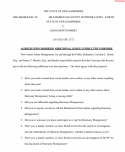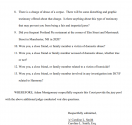You are using an out of date browser. It may not display this or other websites correctly.
You should upgrade or use an alternative browser.
You should upgrade or use an alternative browser.
GUILTY NH - Harmony Montgomery, 7, Manchester, missing after placed in Father's Custody in 2019, reported 2021, *1 Guilty perjury, 1 guilty weapons* #3
- Thread starter weepingangel
- Start date
- Status
- Not open for further replies.
- Joined
- Mar 6, 2018
- Messages
- 61,436
- Reaction score
- 492,269
Potential #AdamMontgomery jurors were given lengthy list of potential witnesses and asked if they know anyone. Also asked if they heard about or formed opinion on #HarmonyMontgomery murder case. @boston25
Here are some of the questions the judge will ask potential jurors during today's selection process. #HarmonyMontgomery


Here are some of the questions the judge will ask potential jurors during today's selection process. #HarmonyMontgomery


- Joined
- Jan 12, 2016
- Messages
- 16,744
- Reaction score
- 164,090
I am going to guess that the defense will present an affirmative defense, completely blaming the step-mother. The fact that she is a witness for the prosecution, and is currently in prison for perjury, is probably a good move. Stepmother of missing girl pleads guilty to perjury
He will probably present as a "wonderful spouse" trying to defend a drug addicted, abusive spouse. It burns me to no end that the DCFS case worker is also part of his defense!!! No doubt, trying to save his career. DCYF had 'no concerns' about Harmony after frequent home visits in months before her death, court documents reveal | Manchester Ink Link
The dysfunction here is epic.
He will probably present as a "wonderful spouse" trying to defend a drug addicted, abusive spouse. It burns me to no end that the DCFS case worker is also part of his defense!!! No doubt, trying to save his career. DCYF had 'no concerns' about Harmony after frequent home visits in months before her death, court documents reveal | Manchester Ink Link
The dysfunction here is epic.
- Joined
- Mar 6, 2018
- Messages
- 61,436
- Reaction score
- 492,269
In NH, jury selection continues in the murder trial of Adam Montgomery. He is accused of killing his daughter #HarmonyMontgomery. We expect opens and a view later. #AdamMontgomery today refused to come to court. This photo from Tuesday.
@boston25
Well, well - #AdamMontgomery is not in court today. He waived his right to be there today. Very interesting. They could have opening statements without him present. #HarmonyMontgomery
Adam is not in court this morning. Judge says he waived his right to be here. She tells the pool of possible jurors not to speculate why Adam is absent and not to infer any negative implication by his no show status. #HarmonyMontgomery
@boston25
Well, well - #AdamMontgomery is not in court today. He waived his right to be there today. Very interesting. They could have opening statements without him present. #HarmonyMontgomery
Adam is not in court this morning. Judge says he waived his right to be here. She tells the pool of possible jurors not to speculate why Adam is absent and not to infer any negative implication by his no show status. #HarmonyMontgomery
State's Amended Witness List for Trial
Link to all filings

 www.courts.nh.gov
www.courts.nh.gov
Link to all filings

State of New Hampshire v. Adam Montgomery - 2nd Degree Murder
State of New Hampshire v. Adam Montgomery Case No: 216-2022-CR-02372 Hillsborough County Superior Court - Northern District Media Contact: [email protected]
- Joined
- Oct 28, 2009
- Messages
- 49,845
- Reaction score
- 416,743
Lots of Montgomerys on the State's witness list.
10:44 a.m.
The jury includes 14 women and three men who, as a whole, appear to be on the younger side.Four women appear to be around my (Amy Coveno's) age.
(Live feed at this link right now)

See live updates: Adam Montgomery's attorneys to acknowledge his guilt on 2 charges at trial
Adam Montgomery's attorneys plan to acknowledge the defendant's guilt on two of the charges when they deliver their opening statement on Thursday.
10:44 a.m.
The jury includes 14 women and three men who, as a whole, appear to be on the younger side.
Four women appear to be around my (Amy Coveno's) age.
(Live feed at this link right now)

See live updates: Adam Montgomery's attorneys to acknowledge his guilt on 2 charges at trial
Adam Montgomery's attorneys plan to acknowledge the defendant's guilt on two of the charges when they deliver their opening statement on Thursday.www.wmur.com
Thx all for the updates.
Honestly IMO the jury could be composed of elderly hamsters and a head of lettuce and still convict AM. Concerns are the reliability of KM and other witnesses, and the state's ability to weave a precise and compelling narrative in a no-body (what an awful expression in the context of HM) case with a child victim in a sea of dangerous character and with what seems like misconduct on the part of CFS in the background.
This case haunts me. Perhaps someday it will haunt AM.
Gardenista
Well-Known Member
- Joined
- Jun 21, 2016
- Messages
- 19,034
- Reaction score
- 182,268
Bob Ward Boston 25
@Bward3
BREAKING: Adam Montgomery says he intends to plead GUILTY to charges of abuse of corpse and falsifying evidence.
Judge is talking to him in open court via Zoom. No jury in the room.
@boston25
#AdamMontgomery #HarmonyMontgomery #TrueCrime
@Bward3
BREAKING: Adam Montgomery says he intends to plead GUILTY to charges of abuse of corpse and falsifying evidence.
Judge is talking to him in open court via Zoom. No jury in the room.
@boston25
#AdamMontgomery #HarmonyMontgomery #TrueCrime
- Joined
- Feb 1, 2024
- Messages
- 1,968
- Reaction score
- 14,094
How you gonna plead guilty to abuse of a corpse and faking evidence, then A. refuse to reveal the location of said corpse B. plead not guilty to murder?
Is he gonna try to throw his then-wife under the bus?
Is he gonna try to throw his then-wife under the bus?
- Joined
- Oct 28, 2009
- Messages
- 49,845
- Reaction score
- 416,743
surely not this fine upstanding citizen?How you gonna plead guilty to abuse of a corpse and faking evidence, then A. refuse to reveal the location of said corpse B. plead not guilty to murder?
Is he gonna try to throw his then-wife under the bus?

yeah, I do believe he is going to do just that. turn it in to a she said he said and neither makes for a very credible witness. sigh. confuse the jury enough so they can't really decide who killed Harmony. He will cop to what he knows state can prove. He dragged Harmony's little body from place to place but will say he was just scared and covering for Kayla and worried people would blame him blah blah blah.
- Joined
- Jan 12, 2016
- Messages
- 16,744
- Reaction score
- 164,090
How you gonna plead guilty to abuse of a corpse and faking evidence, then A. refuse to reveal the location of said corpse B. plead not guilty to murder?
Is he gonna try to throw his then-wife under the bus?
Gotta say, I saw this handwriting on the wall. He is a sick person. They may as well take the deal. Reasonable doubt all over. And it doesn't help any that the CPS worker and documents help support his case.
May as well take it, and try to get the max. I believe that #karma catches up with these people in the end.
Jurors were taken on a "view" this afternoon, a bus trip to relevant locations that will be discussed at trial. Jurors didn't enter buildings but were able to get out of bus at two locations to observe surroundings. At three or four other locations, they remained inside the vehicle and observed from their seats.
Opening statements will be delivered by Prosecution and Defense tomorrow morning. Judge told jurors to return to court at 8:45 a.m. tomorrow for a 9 a.m. start.
Montgomery has the option to attend court or not, making his decision each morning. If he opts to attend trial, a transport will be sent for him. Otherwise he remains at the jail. (Above details per judge during today's live stream)
Opening statements will be delivered by Prosecution and Defense tomorrow morning. Judge told jurors to return to court at 8:45 a.m. tomorrow for a 9 a.m. start.
Montgomery has the option to attend court or not, making his decision each morning. If he opts to attend trial, a transport will be sent for him. Otherwise he remains at the jail. (Above details per judge during today's live stream)
Last edited:
- Joined
- Feb 1, 2024
- Messages
- 1,968
- Reaction score
- 14,094
Why does this guy get to pick and choose when he appears in court?
Seems like Montgomery is getting special treatment, doesn't it? Judge stated defendant has the right to attend the trial proceedings or opt out. Maybe it's a state law. SMHWhy does this guy get to pick and choose when he appears in court?
- Joined
- Feb 1, 2024
- Messages
- 1,968
- Reaction score
- 14,094
Never heard of such a concept. Must be exclusive to this one state.Judge stated defendant has the right to attend the trial proceedings or opt out.
I'm curious about defendants' rights on trial attendance in NH. Will try to do some research on it tomorrow. Maybe another poster knows the law on this and will pass it on.Never heard of such a concept. Must be exclusive to this one state.
- Joined
- Feb 25, 2013
- Messages
- 45,903
- Reaction score
- 476,649
2/7/24
Judge Messer told Montgomery he has to let the court know in the morning if he will attend the trial, and if the answer is 'no' he cannot change his mind.

 www.cbsnews.com
www.cbsnews.com
Judge Messer told Montgomery he has to let the court know in the morning if he will attend the trial, and if the answer is 'no' he cannot change his mind.

Adam Montgomery, charged with killing daughter Harmony in New Hampshire, plans to make "concessions" during trial
Adam Montgomery is charged with killing his five year-old daughter Harmony in New Hampshire.
- Joined
- Feb 25, 2013
- Messages
- 45,903
- Reaction score
- 476,649
NH has some different rules for Criminal trial procedures including no Opening Statements (District Court) except with permission by the Court for good cause shown.
However, in Superior Court, the prosecution makes an Opening Statement but the Opening Statement is optional for the defense. And Opening Statements are limited to 30 minutes (each party allowed one hour for Closing Arguments). [Recently learned Opening Statements are also not permitted in CT (Jennifer Dulos) where they go straight to the first witness]!
Rule 23. Juror Notes and Written Questions
(a) Note-Taking by Jurors. It is within the court's discretion to permit jurors to take notes. If the court permits note-taking, after the opening statements the court will supply each juror with a pen and notebook to be kept in the juror's possession in the court and jury rooms, and to be collected and held by the bailiff during any recess in which the jurors may leave the courthouse and during arguments and charge. After a verdict, the court will immediately destroy all notes.
(b) Questioning of Witnesses by Jurors. With the consent of all parties, the trial judge may permit jurors to pose written questions. If a trial judge decides to permit jurors to pose written questions at trial, the court shall use the following procedure:
(1) At the start of the trial, the judge will announce to the jury and counsel the decision to allow jurors to pose written questions to witnesses. At this time the judge will instruct the jurors on taking notes and, as to the scope of questioning, the procedure to be followed.

 www.courts.nh.gov
www.courts.nh.gov
However, in Superior Court, the prosecution makes an Opening Statement but the Opening Statement is optional for the defense. And Opening Statements are limited to 30 minutes (each party allowed one hour for Closing Arguments). [Recently learned Opening Statements are also not permitted in CT (Jennifer Dulos) where they go straight to the first witness]!
Rule 23. Juror Notes and Written Questions
(a) Note-Taking by Jurors. It is within the court's discretion to permit jurors to take notes. If the court permits note-taking, after the opening statements the court will supply each juror with a pen and notebook to be kept in the juror's possession in the court and jury rooms, and to be collected and held by the bailiff during any recess in which the jurors may leave the courthouse and during arguments and charge. After a verdict, the court will immediately destroy all notes.
(b) Questioning of Witnesses by Jurors. With the consent of all parties, the trial judge may permit jurors to pose written questions. If a trial judge decides to permit jurors to pose written questions at trial, the court shall use the following procedure:
(1) At the start of the trial, the judge will announce to the jury and counsel the decision to allow jurors to pose written questions to witnesses. At this time the judge will instruct the jurors on taking notes and, as to the scope of questioning, the procedure to be followed.

New Hampshire Rules of Criminal Procedure
PREAMBLE These rules are adopted by the Supreme Court of New Hampshire pursuant to the authority established in Part II, Article 73-A of the New Hampshire Constitution. They take effect on January 1, 2024 and apply to all criminal actions filed on or after that date. In exceptional...
- Status
- Not open for further replies.
Similar threads
- Replies
- 223
- Views
- 18K
- Locked
- Replies
- 959
- Views
- 143K
- Locked
- Replies
- 987
- Views
- 131K
- Replies
- 678
- Views
- 52K
- Replies
- 1
- Views
- 367
Guardians Monthly Goal

Goal Reached! We hit our target of 75 new Guardians!
New stretch goal: 100!
Our goal for the month is 75 new Guardians members to sign up. Have you been thinking about becoming a member?
Click here to find out how!
Staff online
-
BreezyflavorModerator
Members online
Total: 2,799 (members: 120, guests: 2,679)
Online statistics
- Members online
- 120
- Guests online
- 2,679
- Total visitors
- 2,799
Totals may include hidden visitors.
Forum statistics
Community Rules
-
Be CivilTreat all members with respect. No personal attacks, harassment, or inflammatory language.
-
Victim FriendlyAlways show respect for victims and their families. No victim blaming or insensitive speculation.
-
Fact-based SourcingProvide credible sources for claims. Distinguish between verified facts and personal theories.
-
Social Media UseDo not post direct links to personal social media profiles of private individuals.
-
Copyright and PaywallsDo not copy full articles. Summarize and link to the original source instead.
-
Privacy and Personal InformationDo not post personal information such as addresses, phone numbers, or workplaces.
-
Registered Sex-OffendersDo not name or speculate about RSOs unless officially named in connection to a case.
-
Stay On TopicKeep discussions relevant to the case or topic at hand. Avoid off-topic tangents.
-
Accounts, Moderation, and DisputesOne account per person. Contact moderators privately for disputes or concerns.
-
Solicitation and FundraisingNo solicitation, fundraising, or promotion of personal ventures without approval.
